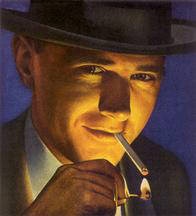 ‘Dead men are heavier than broken hearts.’ (Web Studio 2.0)
‘Dead men are heavier than broken hearts.’ (Web Studio 2.0)
Watchwords
So many
authors - so little time! Welcome to The Telegraph (UK) selection of ‘100 Novels Everyone Should Read’. We hope you enjoy their witty and pithy plot summaries. Do you agree with their selection?
The novels are listed over three pages in descending order. Enjoy! PAGE 3
100 novels everyone should read
The Telegraph (UK) selection of the essential fiction library
- © 34. The Big Sleep by Raymond Chandler—‘Dead men are heavier than broken hearts’
in this hardboiled crime noir.
- © 33. Clarissa by Samuel Richardson—Epistolary
adventure whose heroine’s bodice is savagely unlaced by the brothel-keeping Robert Lovelace.
- © 32. A Dance to the Music
of Time by Anthony Powell—Twelve-book saga whose most celebrated character wears ‘the wrong kind of overcoat’.
- © 31. Suite Francaise by Irène Némirovsky—Published 60 years after their author was gassed, these two novellas portray city and village
life in Nazi-occupied France.
- © 30. Atonement by Ian McEwan—Puts the
‘c’ word in the classic English country house novel.
- © 29. Life: a User’s Manual
by Georges Perec—The jigsaw puzzle of lives in a Parisian apartment block. Plus empty rooms.
- © 28. Tom Jones
by Henry Fielding—Thigh-thwacking yarn of a foundling boy sowing his wild oats before marrying the girl next door.
- ©
27. Frankenstein by Mary Shelley—Human endeavours ‘to mock the stupendous mechanism of the Creator of the world’ have tragic consequences.
- © 26. Cranford by Elizabeth Gaskell—Northern villagers turn their bonnets against the social changes accompanying
the industrial revolution.
- © 25. The Moonstone by Wilkie Collins—Hailed
by T.S Eliot as ‘the first, the longest, and the best of modern English detective novels’.
- © 24. Ulysses
by James Joyce—Modernist masterpiece reworking of Homer with humour. Contains one of the longest ‘sentences’ in English literature: 4,391 words.
- © 23. Madame Bovary by Gustave Flaubert—Buying the lies of romance novels leads a provincial doctor’s wife to an agonising end.
- © 22. A Passage to India by EM Forster—A false accusation exposes the racist oppression
of British rule in India.
- © 21. 1984 by George Orwell—In which Big
Brother is even more sinister than the TV series it inspired.
- © 20. Tristram Shandy by
Laurence Sterne—Samuel Johnson thought Sterne’s bawdy, experimental novel was too odd to last. Pah!
- © 19. The
War of the Worlds by HG Wells—Bloodsucking Martian invaders are wiped out by a dose of the sniffles.
- ©
18. Scoop by Evelyn Waugh—Waugh based the hapless junior reporter in this journalistic farce on former Telegraph editor Bill Deedes.
- © 17. Tess of the D’Urbervilles by Thomas Hardy—Sexual double standards are held up to the cold, Wessex light in this rural tragedy.
- © 16. Brighton Rock by Graham Greene—A seaside sociopath mucks up murder and marriage
in Greene’s literary Punch and Judy show.
- © 15. The Code of the Woosters by PG
Wodehouse—A scrape-prone toff and pals are suavely manipulated by his gentleman’s personal gentleman.
- © 14. Wuthering
Heights by Emily Brontë—Out on the winding, windy moors Cathy and Heathcliff become each other’s ‘souls’. Then he storms off.
- © 13. David Copperfield by Charles Dickens—Debt and deception in Dickens’s semi-autobiographical Bildungsroman crammed with cads, creeps
and capital fellows.
- © 12. Robinson Crusoe by Daniel Defoe—A slave
trader is shipwrecked but finds God, and a native to convert, on a desert island.
- © 11. Pride and Prejudice by
Jane Austen—Every proud posh boy deserves a prejudiced girl. And a stately pile.
- © 10. Don
Quixote by Miguel de Cervantes—Picaresque tale about quinquagenarian gent on a skinny horse tilting at windmills.
- ©
9. Mrs Dalloway by Virginia Woolf—Septimus’s suicide doesn’t spoil our heroine’s stream-of-consciousness party.
- © 8. Disgrace by JM Coetzee—An English professor in post-apartheid South Africa loses everything after seducing a student.
- © 7. Jane Eyre by Charlotte Brontë—Poor and obscure and plain as she is, Mr Rochester wants to
marry her. Illegally.
- © 6. In Search of Lost Time by Marcel Proust—Seven-volume
meditation on memory, featuring literature’s most celebrated lemony cake.
- © 5. Heart of Darkness by
Joseph Conrad—‘The conquest of the earth,’ said Conrad, ‘is not a pretty thing.’
- ©
4. The Portrait of a Lady by Henry James—An American heiress in Europe ‘affronts her destiny’ by marrying an adulterous egoist.
- © 3. Anna Karenina by Leo Tolstoy—Tolstoy’s doomed adulteress grew from a daydream of ‘a bare exquisite aristocratic elbow’.
- © 2. Moby-Dick by Herman Melville—Monomaniacal Captain Ahab seeks vengeance on
the white whale which ate his leg.
- © 1. Middlemarch by George Eliot—‘One
of the few English novels written for grown-up people,’ said Virginia Woolf.
The End! That’s all there is –
there isn’t any more! Really!
100 TOP READS P.1
100 TOP READS P.2
WATCHWORDS HOME
PLEASE NOTE
This list, including text, remains the © Copyright of Telegraph Media Group
Limited 2013—the original list and news and updates of interest to writers and readers may be found at their website at:
http://www.telegraph.co.uk/culture/books/4248401/100-novels-everyone-should-read.html